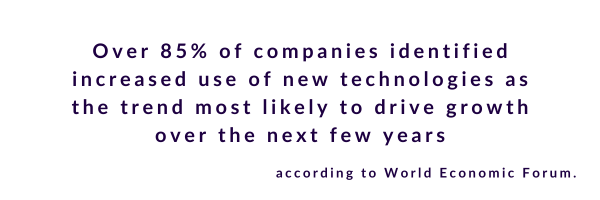Employee needs are changing which means benefits must follow suit. To prepare for the future of work, make financial wellness a part of your benefits strategy.
New developments in benefits technology are reshaping the future of work. Over 85% of organizations surveyed in the World Economic Forum’s 2023 Future of Jobs Report identified increased use of new technologies as the trend most likely to drive growth over the next few years.
With benefits technology constantly evolving, compensation alone is no longer enough to keep your workplace competitive for new hires. Employers must prioritize new technology and cutting-edge support programs if they hope to attract the best talent.
Here are some of the most promising developments employers can expect from the future of work. We offer a special focus on the growing demand for employee financial wellness benefits.
1. Financial wellness tools will become central to the future of work.
Financial wellness tools are gaining popularity among employees of different backgrounds and income levels — and it’s not surprising why. The cost of living has increased steadily over the past few years. According to Forbes, more than a third of Americans struggle with their bills. Another 80% are living paycheck to paycheck.
However, most employers offer outdated benefits as a substitute for financial literacy. Around 98% of employers provide health coverage and 94% provide retirement planning support. Yet, these programs are not equipped to address some of the biggest employee pain points, such as high levels of student debt, the need for credit guidance, and the growing demand for elder care resources.
In PWC’s 2023 Employee Financial Wellness Survey, 73% of financially stressed employees said they would be attracted to another employer that cares more about their financial well-being. Financial stress affects everything from mental health to personal relationships.
So, financial wellness is already becoming a must-have benefit. Its importance is only expected to grow in the coming years. Addressing this issue will be something the majority of employers simply cannot ignore. Financial wellness benefits provide the information and tools needed to combat complex financial hurdles. They empower your employees to take control of their finances.
2. The desire for flexibility and accessibility will expand to benefits options.
The Coronavirus/COVID-19 pandemic shifted the landscape of corporate work in the direction of flexibility and accessibility. Now more than ever, employees are looking for jobs that allow them to work how and when they want.
A recent Upwork study suggested that 22% of workers in America will be remote by 2025. This change has been generally positive. In the same study, 56% of hiring managers claimed the shift to remote work has gone better than expected.
Flexibility in these environments also applies to employee benefits. Financial wellness benefits, for example, are fully customizable – meaning employees can choose the areas that are most pertinent to their situation. Whether someone is looking to pay off debt or learn about savings accounts, these benefits offer resources that support all levels of knowledge and income.
Personalization is the answer to making these benefits accessible and is a key component of the most effective financial wellness tools. According to a Vestwell study, employees hoping to save money are looking for highly tailored financial wellness solutions to solve their issues. For example, 74% of employees with student loans agree that they would be more likely to continue working for an employer that offered student loan-related benefits.
When it comes to financial wellness, the ability to personalize and answer specific questions is key to creating quality benefits that work. Flexible, effective and relevant benefits will improve your employees’ financial lives and improve productivity and quality of life in your company.
3. AI tools are an inevitable addition to the future of work.
AI tools have evolved greatly over the past few years to occupy almost every industry. As it continues to develop at such a significant rate, it’s difficult to imagine a future of work without significant AI involvement:
- Artistic fields: AI has streamlined the creative process, assisting in the creation of music, art, writing and more.
- Healthcare: AI helps eliminate human error in administrative work, providing a streamlined experience when distributing medication and making appointments.
- Customer success: AI chatbots help meet consumer demand by answering client questions.
AI tools are expected to be just as valuable a tool for businesses. This is especially true when it comes to creating better benefits for employees. With AI, employers can evaluate their workforce’s demographics, health records and usage trends to create a benefits system that is best suited for each employee. These tools can be invaluable for HR, enabling them to shape their campaigns to accommodate employees’ needs and preferences.
Workers are consistently looking for ways to get their problems addressed without giving up autonomy. Giving them the tools they need will help your organization stand out in the job market and continue to attract top talent.
Choose an award-winning financial wellness platform for your employees
Best Money Moves is a mobile-first financial wellness solution designed to help dial down employees’ most top-of-mind financial stresses. As an easy-to-use financial well-being solution, Best Money Moves offers comprehensive support toward any money-related goal. With 1:1 money coaching, budgeting tools and other resources, our AI platform is designed to help improve employee financial well-being.
Whether it be retirement planning or securing a mortgage, Best Money Moves can guide employees through the most difficult financial times and topics. We have robust benefits options for employers, regardless of their benefits budget.
Our dedicated resources, partner offerings and 1000+ article library make Best Money Moves a leading benefit in bettering employee financial wellness.
To learn more about Best Money Moves Financial Wellness Platform, let’s schedule a call. Contact us and we’ll reach out to you soon.


